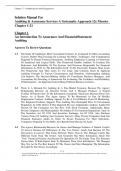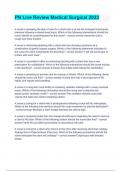Chapter 17 - Completing the Audit Engagement
Solution Manual For
Auditing & Assurance Services A Systematic Approach 12e Messier
Chapter 1-21
Chapter 1
An Introduction To Assurance And FinancialStatement
Auditing
Answers To Review Questions
1-1 The Study Of Auditing Is More Conceptual In Nature As Compared To Other Accounting
Courses. Rather Than Focusing On Learning The Rules, Techniques, And Computations
Required To Prepare Financial Statements, Auditing Emphasizes Learning A Framework
Of Analytical And Logical Skills. This Framework Enables Auditors To Evaluate The
Relevance And Reliability Of The Systems And Processes Responsible For Financial
Information As Well As The Information Itself. To Be Successful, Students Must Learn
The Framework And Then Learn To Use Logic And Common Sense In Applying
Auditing Concepts To Various Circumstances And Situations. Understanding Auditing
Can Improve The Decision-Making Ability Of Consultants, Business Managers, And
Accountants By Providing A Framework For Evaluating The Usefulness And Reliability
Of Information—An Important Task In Many Different Business Contexts.
1-2 There Is A Demand For Auditing In A Free-Market Economy Because The Agency
Relationship Between An Absentee Owner And A Manager Produces A Natural
Conflict Of Interest Due To The Information Asymmetry That Exists Between These Two
Parties. As A Result, The Agent Agrees To Be Monitored As Part Of His/Her
Employment Contract. Auditing Appears To Be A Cost-Effective Form Of Monitoring.
The Empirical Evidence Suggests That Auditing Was Demanded Prior To Government
Regulation. In 1926, Before It Was Required By Law, Independent Auditors Audited 82
Percent Of The Companies On The New York Stock Exchange. Additionally, Many
Private Companies And Municipalities Not Subject To Government Regulations, Such As
The Securities Act Of 1933 And Securities Exchange Act Of 1934, Also Purchase
Various Forms Of Auditing And Assurance Services. Many Private Companies Seek Out
Financial Statement Audits In Order To Secure Financing For Their Operations.
Companies Preparing To Go Public Also Benefit From Having An Audit.
1-3 The Agency Relationship Between An Owner And Manager Produces A Natural Conflict
Of Interest Because Of Differences In The Two Parties’ Goals And Because Of The
Information Asymmetry That Exists Between Them. That Is, The Manager Likely Has
Different Goals Than The Owner, And Generally Has More Information About The
"True" Financial Position And Results Of Operations Of The Entity Than The Absentee
Owner Does. If Both Parties Seek To Maximize Their Own Self-Interest, The Manager
May Not Act In The Best Interest Of The Owner And May Manipulate The Information
Provided To The Owner Accordingly.
17-1
Copyright ©2022 McGraw Hill Education. All rights reserved. No reproduction or distribution without the prior written consent of
McGraw Hill Education.
,Chapter 17 - Completing the Audit Engagement
1-4 Independence Is A Bedrock Principle For Auditors. If An Auditor Is Not Independent Of
The Client, Users May Lose Confidence In The Auditor’s Ability To Report Objectively
And Truthfully On The Financial Statements, And The Auditor’s Work Loses Its Value.
From An Agency Perspective, If The Principal (Owner) Knows That The Auditor Is Not
Independent, The Owner Will Not Trust The Auditor’s Work. Thus, The Agent Will Not
Hire The Auditor Because The Auditor’s Report Will Not Be Effective In Reducing
Information Risk From The Perspective Of The Owner. Auditor Independence Is Also A
Regulatory Requirement.
1-5 Auditing (Broadly Defined) Is A Systematic Process Of (1) Objectively Obtaining And
Evaluating Evidence Regarding Assertions About Economic Actions And Events To
Ascertain The Degree Of Correspondence Between Those Assertions And Established
Criteria And (2) Communicating The Results To Interested Users.
Attest Services Occur When A Practitioner Issues A Report On Subject Matter, Or An
Assertion About Subject Matter, That Is The Responsibility Of Another Party.
Assurance Services Are Independent Professional Services That Improve The Quality Of
Information, Or Its Context, For Decision Makers.
1-6 Auditing Is A Specific Form Of ―Attest Service,‖ Which In Turn Is A Specific Category Of
―Assurance Service.‖ In Other Words, The Phrase ―Assurance Services‖
Constitutes The Broadest Category Of Professional Services Provided By Cpas That
Serve To Improve The Quality Or Context Of Information For Decision Making For Other
Parties. Attest Services Constitute A More Specific Category Of Assurance That Cpas Can
Provide. These Services Are Intended To Reduce Information Risk To Parties Relying On
Information Provided By A Party That Is Creating, Or Making Assertions About, Subject
Matter Of Interest. Cpas Can Provide Attest Services Relating To A Wide Variety Of
Subject Matter (Or Assertions About That Subject Matter) To Reduce The Information
Risk To Third Parties. One Such Subject Matter Is A Set Of Financial Statements. When
A Cpa Provides A Very In-Depth, Detailed Attest Service That Follows Relevant
Standards To Constitute A Complete Examination Of A Set Of Financial Statements And
Related Assertions, This Is Called A Financial Statement ―Audit.‖
1-7 Audit Risk Is Defined As The Risk That The Auditor May Unknowingly Fail To
Appropriately Modify His Or Her Opinion On Financial Statements That Are Materially
Misstated (As 1101). Materiality Is Defined As "The Magnitude Of An Omission Or
Misstatement Of Accounting Information That, In The Light Of Surrounding
Circumstances, Makes It Probable That The Judgment Of A Reasonable Person Relying
On The Information Would Have Been Changed Or Influenced By The Omission Or
Misstatement" (Fasb Statement Of Financial Accounting Concepts No. 8, Chapter 3:
Qualitative Characteristics Of Useful Accounting Information, Which Is Pending Revision
At The Time Of The Writing Of This Book Per The Board’s November 2017 Decision To
Revert To A Definition Of Materiality Similar To The One Found In Superseded Concept
No. 2).
The Concept Of Materiality Is Reflected In The Wording Of The Auditor's Standard
Audit Report Through The Phrase "The Financial Statements Present Fairly In All
Material Respects." This Is The Manner In Which The Auditor Communicates The
Notion Of Materiality To The Users Of The Auditor's Report. The Auditor's Standard
Report States That The Audit Provides Only Reasonable Assurance That The Financial
Statements Do Not Contain Material Misstatements. The Term "Reasonable Assurance"
17-2
Copyright ©2022 McGraw Hill Education. All rights reserved. No reproduction or distribution without the prior written consent of
McGraw Hill Education.
,Chapter 17 - Completing the Audit Engagement
Implies That There Is Some Risk That A Material Misstatement Could Be Present In The
Financial Statements And The Auditor Will Fail
17-3
Copyright ©2022 McGraw Hill Education. All rights reserved. No reproduction or distribution without the prior written consent of
McGraw Hill Education.
, Chapter 17 - Completing the Audit Engagement
To Detect It.
1-8 The Major Phases Of The Audit Are:
• Client Acceptance/Continuance
• Preliminary Engagement Activities
• Plan The Audit
• Consider And Audit Internal Control
• Audit Business Processes And Related Accounts
• Complete The Audit
• Evaluate Results And Issue Audit Report
1-9 Plan The Audit: During This Phase Of The Audit, The Auditor Uses Knowledge About
The Client And Any Controls In Place To Plan The Audit And Perform Preliminary
Analytical Procedures. The Outcome Of The Planning Process Is A Written Audit Plan
That Sets Forth The Nature, Extent, And Timing Of The Audit Procedures To Be
Performed. The Purpose Of This Phase Is To Plan An Effective And Efficient Audit.
1-10 The Auditor's Standard Unqualified Report For A Public Company Client Includes The
Following Sections: (1) Opinion On The Financial Statements, (2) Basis For Opinion, And
(3) Critical Audit Matters, As Illustrated In This Chapter.
1-11 The Emergence Of Advanced Audit Technologies Will Help Remove Many Of The
Tedious Tasks That Are Usually Performed By Junior Auditors. Thus, Auditors Of All
Positions And Experience Will Be Required To Spend Additional Time Reasoning
Through Fundamental Business, Accounting, And Auditing Concepts. An Auditors’
Knowledge In These Areas Will Enable Them To Provide Greater Benefit To Clients By
Asking The Right Questions And Identifying New, More Effective Ways To Collect,
Analyze, And Interpret Results. In Using Audit Data Analytics, For Example, Auditors
Must Understand The Client And Its Industry, As Well As The Fundamentals Of
Accounting And Auditing, In Order To Ask The Right Questions In Querying The Data
And In Interpreting The Results Obtained.
1-12 Auditors Frequently Face Situations Where No Standard Audit Procedure Exists, Such As
The Example From The Text Of Verifying The Inventory Of Cattle. Such Circumstances
Require ThatThe Auditor Exercise Creativity And Innovation When Planning And
Administering Audit Procedures Where Little Or No Guidance Or Precedent Exists.
Every Client Is Different, And Applying Auditing Concepts In Different Situations
Requires Logic And Common Sense, And Frequently Creativity And Innovation.
Answers To Multiple-Choice Questions
1-13 B 1-19 A
1-14 B 1-20 D
1-15 C 1-21 D
1-16 C 1-22 D
1-17 C 1-23 B
17-4
Copyright ©2022 McGraw Hill Education. All rights reserved. No reproduction or distribution without the prior written consent of
McGraw Hill Education.






